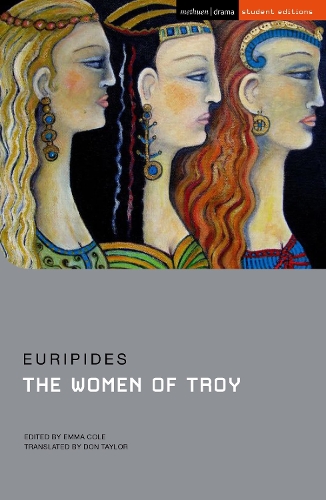
The Women of Troy
(Paperback)
Available Formats
Publishing Details
The Women of Troy
By (Author) Euripides
Translated by Don Taylor
Volume editor Emma Cole
Bloomsbury Publishing PLC
Methuen Drama
29th August 2024
United Kingdom
Classifications
Primary and Secondary Educational
Non Fiction
Tragic plays
882.01
Physical Properties
Paperback
96
Width 128mm, Height 192mm, Spine 10mm
88g
Description
There's no decent way to say an indecent thing An industrial port of a war-torn city. Women survivors wait to be shipped abroad. Officials come and go. A grandmother, once queen, watches as her remaining family are taken from her one by one. The city burns around them. First performed in 415BC, the play focuses on the human cost of war and the impact of loss. This new Student Edition of The Women of Troy includes a commentary and notes by Emma Cole, which looks at the Trojan War as represented in Greek literature and myth; the context in which Euripides was writing and within which the play was first performed; how it would have been originally staged and dramaturgical challenges met; as well as recent performance history of the play, including Katie Mitchell's iconic 2007 production at the National Theatre. Euripides' great anti-war play is published here in Don Taylor's classic translation.
Reviews
The play itself is an astonishing document. Written shortly after the Athenians had butchered the men and enslaved the women of the Sparta-aligned island of Melos, it was filled with a subversive topicality. Euripides focuses on the sufferings of the Trojan Hecuba, Cassandra and Andromache in the aftermath of their city's fall. But the play was clearly intended as a conscience-provoking metaphor about the arrogance of power and the hideous aftermath of war, and it doesn't take much imagination to see it as directly applicable to our own times. -- Michael Billington * Guardian *
Author Bio
Euripides was born near Athens between 485 and 480 BC. His first play was presented in 455 BC and he wrote some hundred altogether of which nineteen survive a greater number than those of Aeschylus and Sophocles combined and which include Alkestis, Medea, Bacchae, Hippolytos, Ion and Iphigenia at Aulis. He died in 406 BC. Don Taylor (1936-2003) was a playwright and poet, and a director of theatre, television and radio plays. He worked as drama director at the BBC, and between 1960 and 1990, he directed nearly a hundred television plays. He translated and directed for BBC Television the Theban plays of Sophocles Oedipus the King, Antigone and Oedipus at Colonus. He followed this with translations of three Euripides war plays Iphigenia at Aulis, The Women of Troy and Helen. He was co-director of Compass Theatre for while and set up First Writes Radio with Ellen Dryden. Don Taylors many stage plays include The Roses of Eyam, The Exorcism, Daughters of Venice, Brotherhood, When the Actors Come, Retreat from Moscow, When the Barbarians Came and his last play The Road to the Sea. Emma Cole is Senior Lecturer at the University of Queensland, Australia. She is a classicist and a theatre and performance studies scholar. Her area of expertise lies in the performance of Greek tragedy in contemporary theatre and she has published extensively on this topic, as well as having worked in collaboration with various theatre companies and practitioners on related creative outputs.
